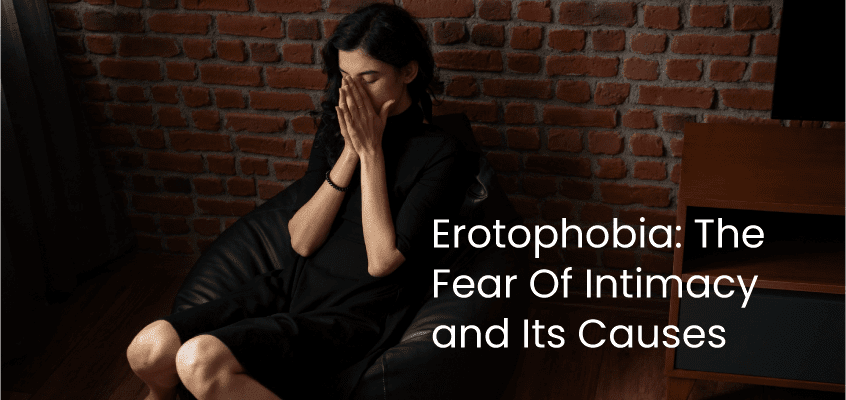We can define intimacy as the closeness shared by people in relationships. It is when we form a close bond with someone and share our innermost thoughts, ideas, and feelings. At times, we may run away from a relationship or hesitate to share our true feelings with someone due to a fear of intimacy, also known as erotophobia.
Let’s learn more about the fear of intimacy, what causes it, its symptoms, its effects on our daily life, and how to overcome it.
What is erotophobia?
Erotophobia refers to the fear of intimacy or negative attitudes toward intimacy due to anxiety about connecting with an individual. It is a phobia that prevents us from becoming close enough to someone to share our feelings or connect emotionally.
Erotophobia may also include fear of sexual intercourse (genophobia) and being touched (haphephobia). It is significant to note that erotophobia not only refers to the fear of intimacy but also includes the real distress or the level of fear this condition creates.
Symptoms of erotophobia
Many of us experience a fear of intimacy but do not realise it because of our lack of knowledge. But it takes time for fear of intimacy to become a phobia. It happens due to our ignorance of the symptoms that might be causing the real distress. Here are some common symptoms of erotophobia:
- Strong negative attitude toward sex
- A negative response to a sexual stimulus
- Trust issues
- Low self-esteem
- Anger issues
- Avoiding any physical contact
- Self-isolation
- A history of unstable relationships
- Reluctance to share feelings or express emotions.
If you want to know whether you fear intimacy, take this quick test today.
Read more about Trust in a romantic relationship
Causes of erotophobia
The fear of intimacy stems from bad experiences in past relationships, usually in childhood. These experiences prevent us from getting close to someone or connecting with them mentally, emotionally, or sexually. Here are the factors or causes of the fear of intimacy:
- Past sexual abuse: Some of us may have gone through child abuse or sexual abuse, which can cause post-traumatic stress disorder (PTSD). It can change our view of sexual intimacy or intercourse and lead to a fear of intimacy or sex. However, not every victim of PTSD may develop a fear of intimacy.
- Fear of abandonment: Many believe engaging in sexual intercourse is linked to emotional attachment. This belief makes us feel that if we form a relationship with an individual, they might abandon us in the future. The fear of abandonment usually occurs due to separation anxiety or the death of close ones.
- Fear of domination: We sometimes feel that indulging in sexual intercourse will give our partner the right to control us, preventing us from getting into intimate encounters. Studies show that such people may have been subjected to ragging or bullying.
- Fear of isolation: Fear of isolation or rejection is linked to the fear of intimacy. Some of us fear being isolated or rejected after forming a close relationship with someone. It usually occurs if we have seen another person experiencing the same and do not want to get similarly hurt.
Must read Sexless Relationship
Effects of erotophobia in daily life
The fear of intimacy can significantly impact a person’s life. Here are the significant effects of erotophobia:
- Negative impact on relationships
- Limited opportunities for romantic relationships
- Making a partner feel unwanted or ignored
- Social isolation and serial dating
- Risk of depression and substance abuse
- Short-term relationships
- Limited opportunities for emotional connection.
Must Read- 5 most common relationship problems
Treatment of erotophobia
Doctors prescribe treating erotophobia using therapy and medications. We should try to understand the events from the past that are changing our present state of mind and habits and leading to the fear of intimacy. The next step is to know your symptoms and seek medical help. The mental health professional will choose the proper treatment method for you. Here are some techniques and medications used to treat erotophobia:
Medication:
Doctors prescribe the following medications for people with erotophobia:
- Prozac (fluoxetine) is a selective serotonin reuptake inhibitor (SSRI) used to regulate mood and anxiety.
- Xanax (alprazolam) is a drug used to reduce anxiety.
- Other drugs for erotophobia include antidepressants, monoamine oxidase inhibitors (MAOIs), beta-blockers, and benzodiazepines. Always consult a doctor before taking these medications.
Psychotherapy:
The primary treatment for phobias is psychotherapy. Therapists help us understand where those fears originate and how to overcome them.
- Cognitive behavioral therapy involves alternative ways of dealing with a phobia and addressing the triggers.
- Hypnotherapy: This therapy reveals past experiences affecting our present mental state and habits. This therapy may help with PTSD.
Sex therapists: These are licensed professionals who specialize in treating sex-related problems.
Conclusion
Realization and acceptance are necessary to overcome the fear of intimacy. Once we realize and understand our situation, we must seek medical help. With the help of our doctor and therapist, we can lessen our fears and form regular physical and emotional attachments again. At United We Care, we have a team of dedicated professionals who are well-equipped to help you and your partner navigate such relationship challenges.
References:
https://www.healthline.com/health/fear-of-intimacy#summary
https://www.healthline.com/health/fear-of-intimacy#summary
https://www.verywellmind.com/fear-of-sex-2671739
https://test.unitedwecare.com/do-you-have-fear-of-intimacy-test-free-quiz/









